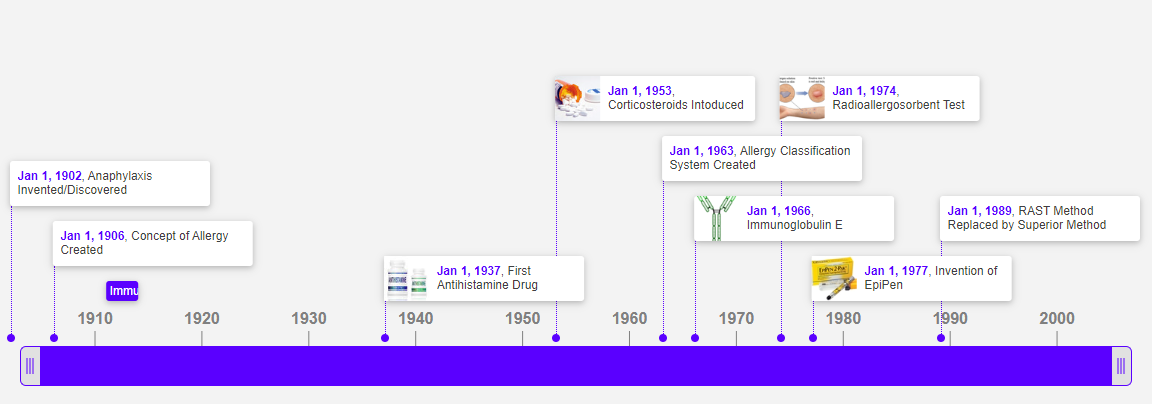Allergies are common today, but they weren’t always so well understood. While asthma symptoms have been documented since the ancient world, the mechanisms that can cause those reactions were less clear – even the concept of food allergies.
Allergies in History
From the earliest recorded records, what we now understand to be allergies are recorded in the annals of ancient China, Rome, and Egypt – the word “asthma” itself comes from the Greek word for “panting” – but understanding pollen as a cause didn’t happen until the 19th century. Moreover, the term “anaphylaxis” didn’t exist until 1902 when Charles Richet and Paul Portier invented the word while researching immunization, and the term “allergy” didn’t even exist until 1906. Allergy was coined by pediatrician Clemens von Pirquet after noticing the way some patients reacted severely to the smallpox vaccine. Von Pirquet originally called it serum sickness.

SOURCE: https://www.timetoast.com/timelines/allergies-timeline
Seasonal Allergies
The modern medical understanding of allergies started with hay fever. Also called summer catarrh, seasonal allergies, or summer colds, it was described clinically by the physician John Bostock in 1819. It became an official diagnosis in the mid-1800’s and later go on to act as a catalyst for the development of allergen immunotherapy in 1911 by Leonard Noon and John Freeman.
Food Allergies
Food allergies have been known for millennia. The Roman philosopher Lucretius had said “What is food to one man is bitter poison to others” in the first century, but food allergies were difficult to prove. Reactions are not always consistent and can sometimes mimic other conditions. In the early 20th century, “exhaustive studies of cases previously dismissed as medical anomalies were demonstrated to be food allergies,” explains National Geographic. “The floodgates opened, and as diagnoses surged many medical practitioners derided food allergies as a passing fad.”
Allergy Diagnoses
While food allergies are taken seriously today, they are not easy to diagnose, and food intolerances are nearly impossible to determine without careful diet monitoring. Hay fever and other allergies can be diagnosed with skin tests, but food allergies are complex.
Food allergies can also be diagnosed through a skin scratch test (developed by Oscar Menderson Schloss in 1912), but results were not consistent, and they were often idiosyncratic, meaning that they don’t manifest in the same ways for every patient. It wasn’t until the late 1930s that allergists Guy Laroche and Charles Richet hypothesized that anaphylactic episodes could be caused by food.
Allergy Research Today
The mechanisms of allergies were not understood until the late 1960s when immunoglobulin E (IgE) was discovered. National Geographic explains: “When someone is exposed to an antigen, peanuts for example, their body produces a specific IgE antibody in a process called sensitization. People prone to allergies produce disproportionate amounts of IgE that remain dormant until the allergen is detected again; they then go berserk, triggering the mast cells to release their allergy-causing chemicals.”
From this discovery, others progressed quickly. In 1977, the EpiPen was created to treat anaphylaxis and in 1982, researchers working on leukotrienes, the inflammatory responses to antigens, won the Nobel Prize.
The Future of Allergy Research
Moving forward, the medical understanding of allergies is still imperfect and still evolving. Allergy immunotherapy has several forms now and is still in the process of becoming a mainstream treatment option. Our understanding of food intolerances and allergies is still growing too, powered by developments in technology, such as microbiome.
